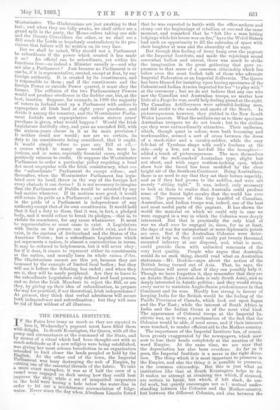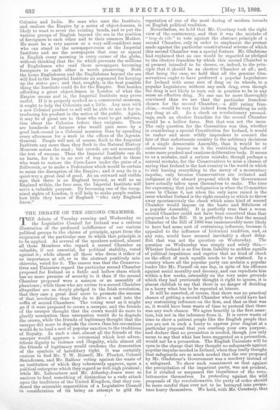THE IMPERIAL INSTITUTE.
IF the Fates love irony as much as they are reputed to love it, Wednesday's pageant must have filled them with delight. In South Kensington, the Queen, with all the Pomp and circumstance at the command of the State, and tvy means of a ritual which had been thought-out with as much solicitude as if a new religion were being established, was giving her most solemn benediction to an organisation intended to knit closer the lands peopled or held by the English. At the other end of the town, the Imperial Parliament was busy destroying the web of Empire, by cutting one of the essential threads of the fabric. To take a more exact metaphor, it was as if half the crew of a vessel were engaged on deck seeing how they could best improve the ship, while a set of misguided carpenters in the hold were boring a hole below the water-line in order to let out a troublesome accumulation of bilge- water. Never since the day when Abraham Lincoln found that he was expected to battle with the office-seekers and stamp out the beginnings of rebellion at one and the same moment, and remarked that he " felt like a man letting lodgings while his house was on fire," have the Weird Sisters had such an opportunity to fill the solitudes of space with their laughter at man and the absurdity of his ways. But though this feeling of irony hung over the pageant at the Imperial Institute, and made the rejoicings sound somewhat hollow and unreal, there was much to strike the imagination in the great gathering that gave ex- pression to that sense of a common citizenship which lies below oven the most foolish talk of those who advocate Imperial Federation or an Imperial Zollverein. The Queen has been blamed for insisting upon having specimens of the Colonial and Indian Armies imported for her " to play with " at the ceremony ; but we do not believe that any one who saw the Canadian and Australian troops, no matter how little of a Jingo he was, could help feeling proud at the sight. The Canadian Artillerymen were splendid-looking men, and did credit to the woods and snows of the North. In picturesqueness, however, they yielded to the New South Wales Lancers. What the soldiers say as to these specimen Australian troopers we do not know ; but to the civilian eye they were extraordinarily attractive. Their uniforms, which, though quiet in colour, were both becoming and workmanlike, seemed a sort of cross between the dress of a stock-rider and a cavalry-soldier, while the easy felt-hat of Tyrolean shape with cock's feathers at the side—only a few, not a bat-full like the bersaglieri- added a touch of picturesqueness. The men themselves were of the well-marked Australian type, slight but not short, and with eager restless-looking eyes, which show how the breed has been modified by the clear bright air of the Southern Continent. Being Australians, there is no need to say that they sat their horses superbly, and as if they had grown to the saddles, and were not merely " sitting tight." It was, indeed, only necessary to look at them to realise that Australia could produce some of the finest light cavalry that the world has ever seen. The presence of this tiny handful of Canadian, Australian, and Indian troops was, indeed, one of the best and most useful parts of the pageant. It has shown the world the material on which we could rely in case we were engaged in a war in which the Colonies were deeply interested. But that is practically the only kind of war we shall ever be engaged in, since, for us at least, the days of war for unimportant or mere diplomatic points are over. But if the Australian Colonies were deter- mined to help us, they could easily put twenty thousand mounted infantry at our disposal, and, what is more, could provide them with unlimited remounts of the very best quality. People who argue that Australia would do no such thing, should read what an Australian statesman—Mr. Deakin—says about the notion of the British being turned out of Asia. That, he says, the Australians will never allow if they can possibly help it. Though we have forgotten it, they remember that they are an Asiatic State (Austral-Asia is only South Asia), and so deeply interested in Asiatic politics ; and they would strain every nerve to maintain Anglo-Saxon predominance in that Continent and its seas. Hardly less strong in favour of keeping India for the British would be the feeling of the Pacific Provinces of Canada, which look out upon Japan and the Far East ; while the interest of South Africa in India and the Indian Ocean is of the most vital kind. The appearance of Colonial troops at the Imperial In- stitute was, as it were, a proclamation of the fact that the Colonies would be able, if need arose, and if their interests wore touched, to render efficient aid to the Mother-country.
The importance of the Imperial Institute has, of course been grossly exaggerated by the newspapers, which seem• now to lose their heads completely at the mention of the word Empire. At the same time, we are sure that the depreciation has also been overdone. As far as it goes, the Imperial Institute is a move in the right direc- tion. The thing which it Is most important to preserve in the Empire, and also the thing it is possible to preserve, is the common citizenship. But this is just what an institution like that at South Kensington helps to do. It makes no attempt at straining ties which, if strained, are certain to break, but which, if left slack, do use- ful work, but quietly encourages not of 1/ mutual under- standing between the Colonies and the Mother-country, but between the different Colonies, and also between the Colonies and India. No man who uses the Institute, and realises the Empire by a series of object-lessons, is likely to want to sever the existing bonds, and to put the various groups of English beyond the sea in the position of foreigners to each other and to their common Mother. He must be, a very narrow or a very self-confident man who can stand in the newspaper-room at the Imperial Institute and see the newspapers that roar or squeal in English every morning in every corner of the globe, without thinking that the tie which prevents the millions of Englishmen who read these newspapers becoming foreigners to each other is worth preserving. Both the home Englishman and the Englishman beyond the sea will find in the Imperial Institute an argument for keeping up the status quo ; and that, roughly, is the best possible thing the Institute could do for the Empire. But besides affording a great object-lesson in London of what the Empire means and is, the Imperial Institute may prove useful. If it is properly worked as a commercial museum, it ought to help the Colonists not a little. Any man with a new Colonial product to sell will be able to use it for in- troducing his product to the notice of the public. Again, it may be of great use to those who want to get informa- tion about the Colonies before they emigrate. There are hundreds of farmers who would gain more by a good look-round in a Colonial museum than by spending every afternoon for a week in the offices of the Agents. General. People will not, of course, flock to the Imperial Institute any more than they flock to the Natural History Museum across the road ; but crowds are not necessarily the test of success. Thus the Imperial Institute can do no harm, for it is in no sort of way attached to those who want to restore the Corn-Laws under the guise of a Zollverein, or to make a Federation which would be certain to mean the disruption of the Empire ; and it may do in a quiet way a great deal of good. As an outward and visible sign that there is an England beyond, as well as an England within, the four seas, the Imperial Institute will serve a valuable purpose. By becoming one of the recog- nised sights of London, it will help to make people realise how little they know of England " who only England know."



































 Previous page
Previous page